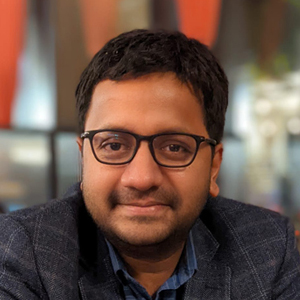Prof. Karthik Shekhar is currently the John F. Heil Jr. Professor in Chemical and Biomolecular Engineering at the University of California, Berkeley. After graduating with a Dual Degree from IIT Bombay, he received his PhD in Chemical Engineering from MIT, USA, in 2015. Between 2015 and 2019, he was a postdoctoral fellow at the Broad Institute of MIT and Harvard University, USA.

Prof. Shekhar studies basic questions at the intersection of neuroscience, computational biology, and physics. His work has contributed to our current understanding of the cellular building blocks of the brain. Focusing on structures involved in vision, such as the retina and the visual cortex, he has combined modern genomics technologies and computational methods to gain fundamental insights into how diverse neuronal types are generated during early development, and how they evolve over hundreds of millions of years.
An example of recent work (Hahn et al., Nature, 2023) uncovered the evolutionary origins of neurons that predominate visual transmission from the human eye to the human brain. The results are surprising, and open new ways to uncover the evolutionary history of human brain specialization. Another example (Cheng et al., Cell, 2022) revised the classical “nature-nurture” view of brain development. Specifically, his work has shown that specific subsets of neurons in the brain rely on early sensory experience (nurture) for the specification of their fundamental properties such as molecular identity, connectivity, and function, which were hitherto believed to be genetically determined (nature).
While being rooted in his goal to advance basic knowledge, he also actively collaborates with neurobiologists and clinicians to translate these f indings towards efforts to prevent neurodegeneration in diseases such as glaucoma and Alzheimer’s disease.
Prof. Shekhar has already won several awards and accolades in his very young career. He won the Dr. Douglas H. Johnson Award, National Glaucoma Research, 2023; the Donald Sterling Noyce Prize, UC Berkeley, 2023; the McKnight Scholar in Neuroscience, 2023; the Scialog Award in Microbiome, Neurobiology and Disease, 2023; the Departmental Teaching Award, University of California, Berkeley, 2023; the Society of Hellman Fellowship, 2022; the Rita Allen Foundation Scholars Program (Finalist), 2022; Member, Next Generation Leader Council, Allen Institute of Brain Science, 2022; the Departmental Teaching Award, University of California, Berkeley, 2022; the NIH Pathway to Independence Award (K99/R00), 2018; the Outstanding Graduate Teaching Assistant Dept. of Chemical Engineering, MIT, 2013; the Best Graduate Student Seminar, Dept. of Chemical Engineering, MIT, 2013; the Poitras Pre doctoral Fellowship for Biomedical Research, MIT, 2011; the Jerry & Geraldine S. McAfee Fellowship, Dept. of Chemical Engineering, MIT, 2008; the Best Master’s Thesis Award, IIT Bombay, 2008; and the Institute Silver Medal, IIT Bombay, 2008.
Hobbies: “Reading, studying the history of science, watching movies, and travelling.”
